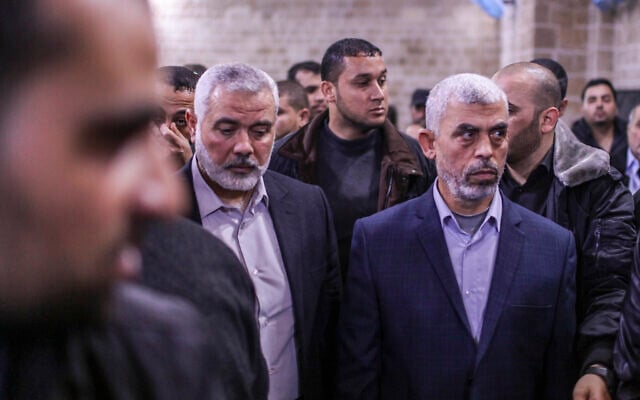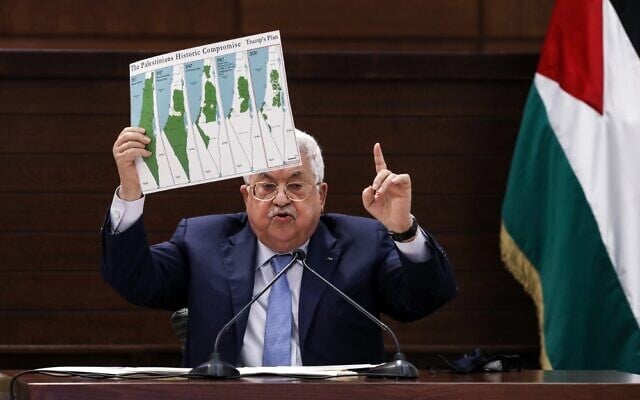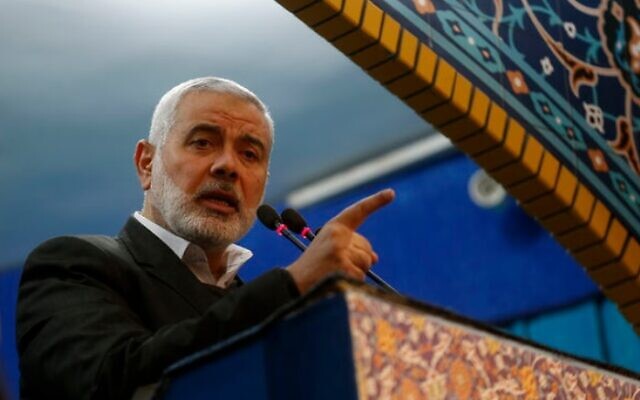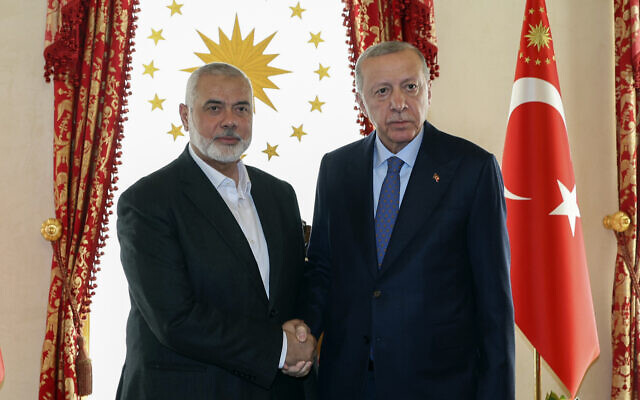


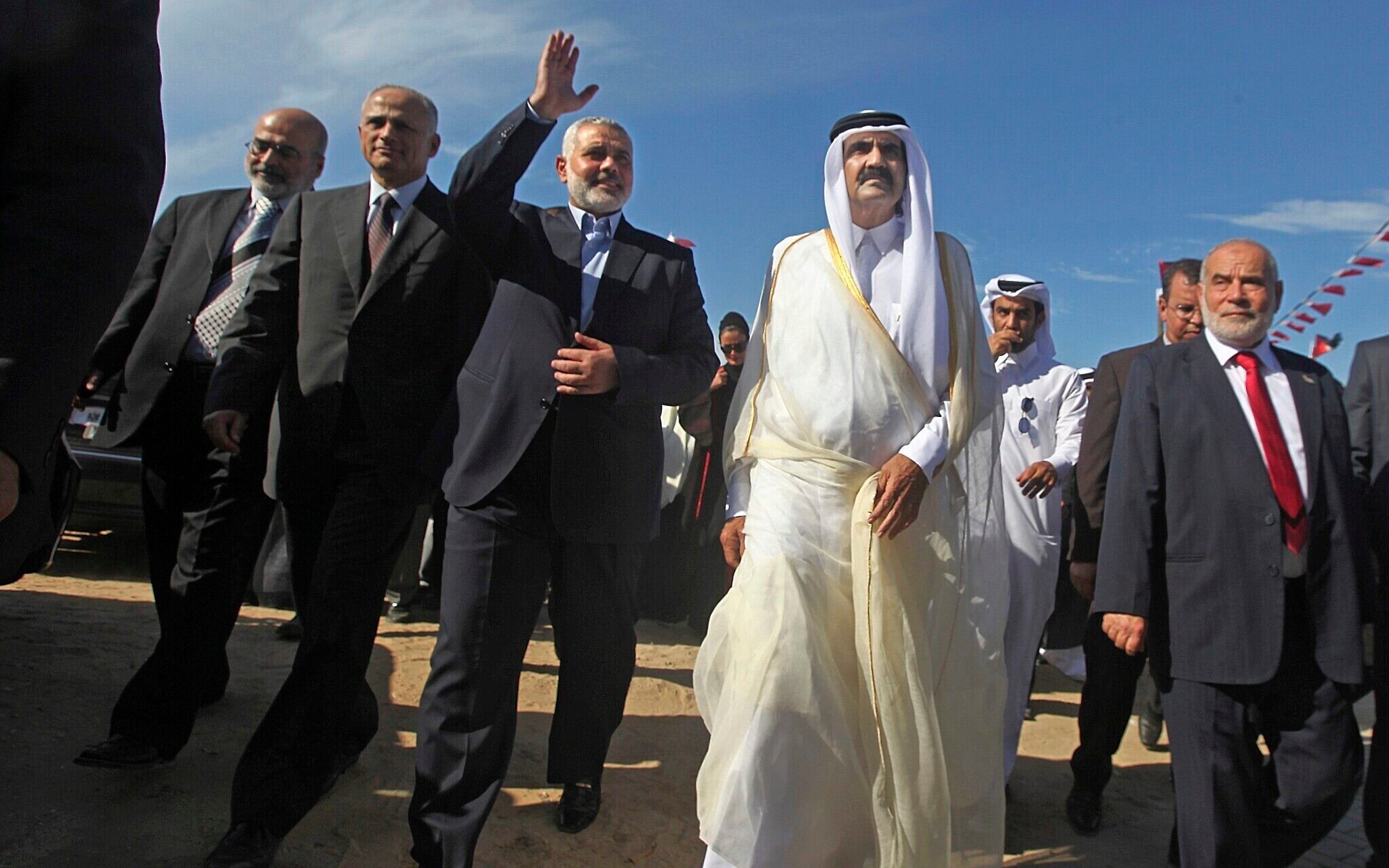
Documents seized in Gaza over the course of the war against Hamas and published by an Israeli TV channel Sunday night purport to shine a light on Qatar’s intensive collaboration with the terror group spanning a number of years, including attempts to thwart regional peace efforts by the US, marginalize Egyptian influence on Gaza, and bolster the roles of Turkey and Iran.
The documents appear to contradict Prime Minister Benjamin Netanyahu’s recent characterization of Qatar as a “complicated state, but not an enemy state,” and his attempts to downplay years of Qatari cash infusions of millions of dollars a month to Hamas in Gaza, which he recently claimed didn’t play a significant role in allowing the terror group to prepare for, and execute, its ongoing war against the Jewish state, which erupted with the October 7, 2023, invasion and massacre in southern Israel.
According to Channel 12 news, the documents show that the payments, which were transferred with Israel’s blessing, were significant enough that in December 2019, then-Hamas politburo leader Ismail Haniyeh told Qatar’s Foreign Minister Mohammed bin Hamad Al Thani that the Gulf state’s cash to Gaza was “Hamas’s main artery.”
In May 2021, immediately after the conclusion of an 11-day mini war between Israel and Hamas, Haniyeh told the terror group’s leader in Gaza Yahya Sinwar that Qatari emir Tamim bin Hamad bin Khalifa Al Thani had privately “agreed on discreet financial support” for the group’s “resistance” efforts, according to the report.
“He agreed in principle to supply the resistance discreetly, but he does not want anyone in the world to know. Until now, $11 million dollars have been raised from the emir for the leadership of the movement,” Haniyeh reportedly wrote.
The political leader asked Sinwar to “write a letter, in which you will focus on the military campaign, your urgent needs —and dedicate the victory [in the war] to His Highness.”
In addition to Doha’s cash, Qatari intelligence officials reportedly met with a Hamas representative at one point — the report did not provide a date — to discuss supervising special training units for Hamas fighters on military bases in Qatar and Turkey, and for the integration of Syrian Palestinians who fled to Lebanon amid the Syrian civil war into Hamas’s Lebanese battalions.
That meeting was recorded, according to Channel 12, in a classified document belonging to the Palestinian Authority.
Qatar’s role in supporting Hamas, including years of monthly cash grants officially earmarked for fuel purchases intended to help keep a lid on economic pressures in the beleaguered Strip, have become a major issue in Israel in recent months as critics examine its role in the ongoing war. The questions have been compounded by an active criminal investigation into alleged illicit ties between members of Netanyahu’s staff and Doha.
Both Haniyeh and Sinwar have since been killed amid the ongoing war — Haniyeh while visiting Iran, in an assassination that Israel later took credit for, and Sinwar by Israel Defense Forces soldiers operating in the southern Gaza Strip.
Several of the documents cited by Channel 12 covered Hamas and Qatar’s response to US President Donald Trump’s so-called “Deal of the Century” in 2020 for a permanent resolution to Israel’s conflict with the Palestinians, and the American leader’s efforts to forge normalization agreements between Israel and Arab countries in the Middle East.
Trump’s plan, framed as a “realistic” two-state solution, offered the Palestinians a state on roughly 70 percent of the West Bank that wouldn’t include Israel’s settlements, as well as a chunk of the Negev desert and a hefty economic aid package. It was rejected by the PA and has since largely been discarded.
In June 2019, over a year before the United Arab Emirates and Bahrain agreed to normalize relations with Israel in August 2020, Qatari Emir Al Thani told Hamas leaders that Oman was signaling an openness to forging ties with Jerusalem.
“With respect to Palestine — Oman is on one side and we are on the other side,” he reportedly told them during the emergency meeting.
At the meeting, Khaled Mashaal told the emir: “We must work together to oppose the Deal of the Century and eliminate it.”
Some six months later, a Hamas delegation traveled to Iran for the funeral of Islamic Revolutionary Guards Corps commander Qassem Soleimani, who was killed in an American airstrike in Iraq in early January 2020. Hamas leader Ismail Haniyeh thanked the Qataris for flying the delegation to Iran, according to the papers.
When Hamas, internally, considered what would happen if Qatar itself were to normalize relations with Israel, it determined such a deal would mean “the elimination of the Palestinian national project,” according to Channel 12, citing a secret brief from the terror group.
In another document — parts of which were previously reported by Channel 12 — Sinwar told Haniyeh that Hamas should push for Qatar to have a larger role in mediating to end flare-ups with Israel rather than Egypt, describing Doha as more loyal to the group than Cairo.
“We can help with this and open big doors for them, as happened around the escalation of the incendiary balloons in August 2020,” the Gaza leader wrote, referring to a months-long campaign in which the terror group and others in Gaza sent daily arson balloons into Israel, sparking damaging fires and drawing reprisal Israeli airstrikes.
“The Egyptians were attempting to restrain the escalation, and we caused them to leave the picture with empty hands. In their place, the Qataris came, and we gave them an opportunity to dictate the fruits of diplomacy,” wrote Sinwar, who went on to mastermind the October 7, 2023, attack.
Amid the ongoing war sparked by the 2023 attack — in which some 5,000 Hamas-led terrorists invaded southern Israel from Gaza, killing some 1,200 people and taking 251 captives — both Qatar and Egypt have functioned as mediators amid ceasefire-hostage negotiations between Israel and the terror group.
Two of Netanyahu’s senior aides are currently suspected of taking money to spread pro-Qatari messaging to reporters, in order to boost the Gulf state’s image as a mediator.
A judge in the case — known in Israel as “Qatargate” — said that Qatar also wanted one of the aides, the premier’s former spokesman Eli Feldstein, to spread negative messaging about Egypt’s role in the negotiations.
Qatar has denied making moves aimed at marginalizing Egypt.
In May 2022 — some 17 months before the surprise invasion of Israel that sparked the ongoing war, and as US-backed normalization efforts between Israel and Arab states continued — Sinwar wrote to Haniyeh that Turkey, which has ties with Israel, should also take a leading role in efforts against Israel.
“It is on you all to begin to prepare the campaign,” he wrote to the political chief of the terror group. “We must begin immediately with our allies — Iran, Qatar, and Turkey. Qatari and Turkish diplomacy must be in a leading role. Our role is to make it hard for the occupation to breathe and ensure the severing of international actors’ diplomatic ties with them.”
Likewise, when a Hamas delegation was visiting Iran — in another incident whose date was unclear from the report — the head of the Iranian Foreign Ministry’s strategic policy office told the terror group officials, “We are happy about the Qatari-Turkish support for you.”
Seven months before the October 2023 attack, Sinwar spoke with Haniyeh about Iran’s opposition to the drive for normalization, which was largely centered on bringing Saudi Arabia into the Abraham Accords.
At the time, Iran had just agreed to a China-brokered rapprochement with Saudi Arabia, ending years of strained relations between the countries. According to the documents cited by Channel 12, Sinwar told Haniyeh that Tehran had no interest in Hamas also reaching out to countries in the Saudi sphere of influence.
“They don’t want calm or agreements,” he said of the Iranians. “They don’t want us to establish relations with their rivals or enemies, countries that are establishing normalization with America and the Zionist enemy. But they are ready for ties with Qatar and Turkey.”

